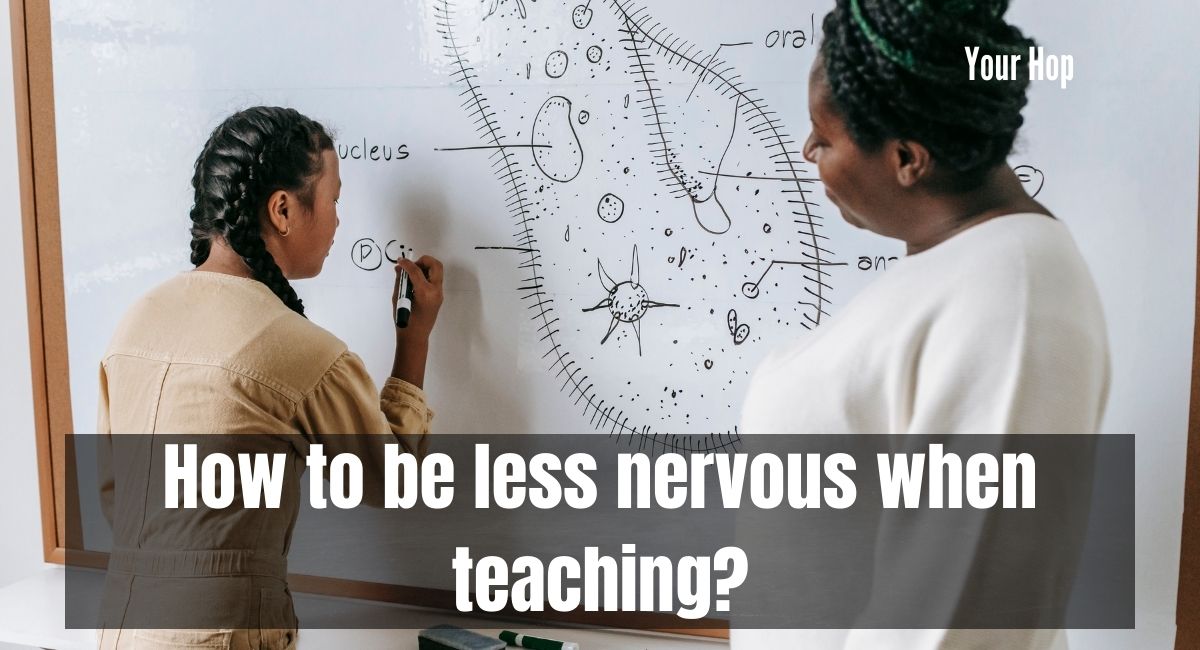If you are a fresher teaching professional, then you might have experienced nervousness while teaching. This is a common issue that new teachers experience even when they have got training to teach. Even this issue can be encountered by experienced teachers who start teaching after a long time or after a semester. So many new and experienced teachers have a question in mind, how to be less nervous when teaching?
Actually, this nervousness while teaching can be easily calmed down and can be turned into confidence. Many tips are available that can help you become less nervous about teaching and while teaching. Let’s take a look at them!
What can cause nervousness for teachers?
The fight-or-flight response to perceived dangers is baked into our brains. So as soon as you’re faced with a frightening situation, your body goes into overdrive, shutting down non-essential activities like digestion and increasing blood flow, muscular tension, and sweat so that you can either crush the threat or flee for your life.
Fear of public speaking is perceived as such a threat. As teachers have to speak in front of students, they start to feel like this, and that’s why they become anxious or nervous. Many new teachers feel anxious about becoming a teacher due to fear of speaking in front of a large number of students.
When administrators or institution supervisors are present, anxiety levels rise.
This nervousness or anxiety can result in:
- The effectiveness of teaching is compromised.
- It inhibits instructors’ ability to be kind and supportive to their students.
- As a coping mechanism, dogmatism rises (teachers may also become overly strict or lenient).
- Teachers develop skepticism about pupils.
- Preservice teachers consider different jobs as a result of this.
11 Tips on How to be less nervous when teaching?
So you know the reasons for being nervous about teaching, now you need to know the tips that will help you to be less nervous when teaching. Follow these mentioned tips, and all your fear and anxiety about teaching will go away, and you will feel confident.
1) Breathe your nervousness out
To alleviate tense tension, shake your limbs. Then, slowly and thoroughly inhale and exhale from the belly, keeping your hands on the back of your hips. Positive imagery, in conjunction with breathing exercises, may assist you in relaxing and putting you on the path to success.
Release tense energy prior to class by jumping up and down 15 times in the restroom.
2) Pump yourself up
Listen to your favorite pump-up music on the way to school or before your first class begins through your headphones. If caffeine is your thing, add an additional shot of espresso to your morning coffee. Finally, boost your self-talk to motivate yourself.
Almost immediately, you’ll realize that you’ve transformed those annoying anxieties into sizzling excitement, which will aid you in capturing the attention of your new students.
3) Take the help of your colleague.
Finding a senior educator who can act as a mentor is a simple method to increase your self-confidence as a first-year teacher. In addition, teacher mentorship may be an excellent technique for new teachers to understand their new profession’s “ins and outs” while also building a support network.
As a bonus, having a mentor to aid new teachers through their first year of teaching can significantly improve retention rates.
4) Prepare an introduction
You may be concerned about how your students will react to you at the first meeting. In addition to a desire for their approval, it is important that they see you as a serious professional. Therefore, plan your introduction in advance so that you are prepared for the first day of school and can say precisely what you want to.
To have a good school day, it’s important to state your expectations for the class in your introduction. This will ensure that everyone knows what’s expected of them.
5) Plan what you are going to teach
Unpreparedness might trigger anxiety. You can easily get stuck in a vicious cycle of feeling unmotivated and fearful. However, teachers who prepare ahead report feel less anxious. Certain teachers prepare in advance for a whole unit, quarter, or even the school year.
So try to prepare what you are going to teach in the class, so you feel confident and less nervous.
6) Start the class with a ritual.
One of the most nerve-wracking parts of starting a new lesson is the first few minutes, and thinking about those minutes can make you nervous about teaching. So, to alleviate the stress and anxiety before starting class, create a ritual.
A good news minute, in which students may share amusing or intriguing stories from their life, is a fantastic idea. For the first few minutes of each day, this is an excellent technique to remove yourself from the center of attention.
7) Be prepared for anything.
You’ll want to mentally prepare for every situation that may arise on your first day of teaching. Although you cannot possibly plan for every eventuality, being prepared to cope with a problem that has been anticipated is far simpler than dealing with unforeseen roadblocks.
Before starting the school day, consider any concerns that may arise during your first class, such as those involving students’ personal lives, classroom misunderstandings, behavior problems, and bad grades, and then consider how you will react and respond to these situations.
8) Be yourself
The best answer to how to be less nervous when teaching is to be the true version of yourself. While authority stems from competence, this does not mean you must be flawless – no one is. When confronted with a difficulty, a professional does not panic but instead searches for a solution calmly. Therefore, put aside your concerns about being faultless and focus on your response when things do not go as planned.
If snafus in class cause your stomach to sink and your heart to beat, this is an indication that you’re viewing difficulties as reflections of your self-worth.
When this occurs, take a moment to reflect. Take a big breath, smile, and address the matter directly. Then, shift your focus away from yourself and toward the problem at hand, inviting your pupils to assist you in resolving it.
9) Think about the worst consequences
Ask yourself what may go wrong. Instead of flooding your mind with nonsensical ideas, you’ll be inundated with reasonable ones. A widespread sense of dread and panic may be felt without your knowledge. So, fear can be dispelled by asking oneself, “What’s the worst that can happen?” or something like that.
10) Eat healthily and exercise.
Regular physical activity releases your body’s natural feel-good chemicals, the endorphins, into your system, resulting in a more upbeat mood.
Finding an activity that you like and is social will help with this – such as Zumba, horseback riding, cycling, or swimming. Combining exercise with a balanced diet rich in fruits, vegetables, and whole grains is critical.
11) Applaud yourself
If you have passed the first day of school without any anxiety or nervousness, then you have known the art of how to be less nervous when teaching. Be proud of what you have achieved and what you are about to accomplish as you steer young brains and, therefore, the country’s future.
What can schools do to make teachers less nervous about teaching?
It’s not just the task of a new teacher to stay confident and less nervous on their first day of school; the school needs to be helpful too. Even the school needs to regularly check on the other teachers if they are facing any issues while teaching or with anything else. Schools must be receptive to anxious teachers.
Here are some things schools should do to help their teachers to be less nervous about teaching:
- Be on the lookout for symptoms of poor self-esteem among teachers
- Mentor freshly qualified teachers.
- Assure that all staff members have time for a break during the day.
- Ascertain that job duty are distributed fairly among employees.
- Recognize what teachers do throughout the year – they require positive reinforcement and support from colleagues.
- Instruct students and teachers on stress reduction and coping skills.
- Social-emotional learning (SEL) is a way to improve mental health in your school. There are programs for students that are also good for teachers.
Bottom Line
These were the 11 tips that answered how to be less nervous when teaching. If you are new to the teaching profession, then these tips will be a sure shot to being nervous about teaching. However, if you are a veteran teacher, then share these tips with the new teacher in school to help them out.
We hope this article was helpful & informative. Please leave your valuable thoughts & suggestions in the comments.
Thank you for reading!






